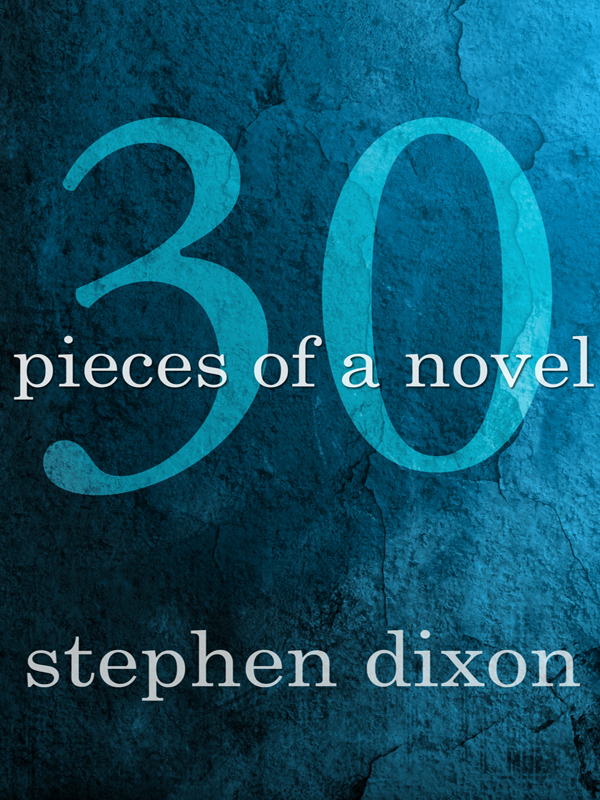
30 Pieces of a Novel
- اطلاعات
- نقد و بررسی
- دیدگاه کاربران
نقد و بررسی

May 3, 1999
Dixon's fiction never stops. Not only does he write lots of it (30 being his 20th book; see review of Sleep, Forecasts, Feb. 1); not only are his memorable protagonists nonstop worriers or talkers; not only do his sentences, paragraphs, dialogues and monologues spread out (a typical paragraph lasts two pages)--but his insights into motive, emotion, interaction, speech and thought are as prodigious as his output. Reading Dixon's fiction amounts to following him as far into his characters' thoughts as he can go. 30 takes its name from its 30 "episodes," all surrounding Dixon's alter ego, Gould Bookbinder, like Dixon a New York writer with two daughters, who teaches at a college in Baltimore. Gould's wife, Sally, has MS; she and Gould's mother both use wheelchairs. The stories interweave episodes from Gould's earliest childhood ("The Dinner Table") to his divorce ("The First Woman"). As in Dixon's best-known novel, Frog, small or banal incidents take up pages of thoughts and dialogue and recollection: the effect is stroboscopic, a reel of minutiae that turns ordinary days into intricate, compulsive rituals. Perhaps the funniest episode is "The Burial," in which Gould tries to steal a book of Emily Dickinson's poetry from a public library to read at his mother's funeral. Other stories depart from realism: "The Miracle" cures Sally's disability, and "Ends" presents several handfuls of incompatible ways to end the novel (in several, Gould dies). Dixon's prose can be brilliantly accurate, or draining, or excruciating, or all three. Sometimes the novel feels vertiginously dense, like a three-hour movie consisting solely of closeups. At other times it's simply more demanding, and more rewarding, than ordinary, ordinarily plotted, novels. Dixon owes Joyce a lot, and it's entirely appropriate that the end of "Ends" invokes the Molly Bloom episode in Ulysses; Dixon's intentions are certainly on that scale. (May) FYI: Two of Dixon's previous novels, Interstate (1995) and Frog (1991), were finalists for the National Book Award.

May 15, 1999
What more is there to say about Gould Bookbinder, the sex-obsessed antihero of Gould: A Novel in Two Novels (LJ 1/97)? Dixon has come up with 30 more chapters of Gouldiana, recounting the hopes, regrets, and anxieties of his later years. In this new installment, Gould is an aging academic who lives in New York City with his wheelchair-bound wife, who suffers from MS. All of his mental energy goes into elaborate sexual fantasies involving much younger women. A waitress at a vacation resort in Maine, the daughter of a faculty colleague, a young woman playing frisbee in the park--in Gould's mind they all want to have sex with him. Dixon presents Gould's obsessions in extravagant run-on sentences that build into page-long paragraphs. Each chapter is essentially a self-contained short story. The overall effect is engaging and somewhat addictive. Gould is a self-centered boor, but he is also a very recognizable Everyman. Recommended for larger fiction collections. [Dixon fans should also consider Sleep, a story collection he has published this spring with Coffee House Press, ISBN 1-56689-081-0, pap. $15.95.--Ed.]--Edward B. St. John, Loyola Law Sch., Los Angeles
Copyright 1999 Library Journal, LLC Used with permission.

March 1, 1999
Dixon continues the episodic epic of bumbling but endearing Gould Bookbinder that he began in "Gould" (1997) and will most likely extend beyond the 30 chapters presented here. A master at articulating the mind's chaos, Dixon eschews linearity and plot to capture the repetition and randomness not only of thought but of life. A writer, husband, and father of two daughters, just like his creator, Gould is a doppelganger not unlike the writer-heroes of Henry Roth and Philip Roth. Full of lust for nubile strangers, Gould is nonetheless loving and loyal, caring tenderly for his slowly dying mother (with whom he conducts excruciating yet amusingly bizarre conversations), his wife, who seems to be suffering from multiple sclerosis, and his sharp-witted daughters. Now 58 and confronted with dysfunction and disease, Gould is no longer blithe about sex, but his fantasy life is randy and he finds himself in the most ridiculous and poignant predicaments. Dixon's loquaciousness can be fatiguing, but the visions that emerge from the babble are piquant and memorable. ((Reviewed March 1, 1999))(Reprinted with permission of Booklist, copyright 1999, American Library Association.)




دیدگاه کاربران